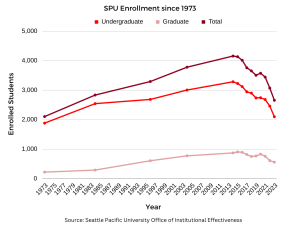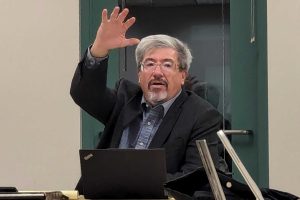Open letter to the Board of Trustees from Blake Dahlin
April 19, 2021
It is an open secret at Seattle Pacific that, hidden in the annals of the university’s website, lies a grossly misconstrued theology of sexuality that guides the university’s hiring policies: the infamous Statement on Human Sexuality. Once again, Seattle Pacific’s Board of Trustees has remained unrepentant of the hate codified in the statement. Furthermore, they have continued in willful disobedience of the Gospel of Jesus Christ, by actively marginalizing, in the past and in the present, those who were created outside of the gender and sexual binary.

The theology of the Statement on Human Sexuality is fundamentally and intentionally flawed, in order to wash over the diversity and complexity of the Biblical witness, in support of traditional white American values. From its outset, the Statement on Human Sexuality relies upon a binary view of gender that is not supported by the Scriptures. It affirms that human beings are made in the image of God, male and female. That idea is ripped from the first few chapters of Genesis, but it is not supported by the whole of the Biblical witness.
From the promise to eunuchs in Isaiah 56, to the distinctly un-masculine actions of Jesus, to the Ethiopian eunuch in the book of Acts, there is clear evidence within Scripture that human beings do not always cleanly fit into the neatly defined categories of “male and female,” and that the Kingdom of God includes these people as well. Amnesty Internation estimates that approximately 1.7% of the world’s population is born intersex. These realities should call the “male-female” binary upon which the Statement on Human Sexuality is based into question. The fact that the complexity and ambiguity of the Biblical witness and the scientific facts have been completely ignored by the Board of Trustees in the compiling, and subsequent refusal to remove the Statement on Human Sexuality, reveals that they are not interested in engaging with a faithfully Christian pursuit of the truth on this matter. It is a theology that is stuck in the first few chapters of the book of Genesis, with little hope or good news to share with the contemporary world. It is a theology that tells intersex and queer students that there is no place at the table for them because of how they were born.
This should disturb every faithful Christian, no matter where they stand on this issue. Seattle Pacific’s Board of Trustees has once again refused to acknowledge the full depth and breadth of the Biblical text and have therefore utterly failed in their duties as stewards of a University that has been built by the body of Christ and sustained by faithful disciples for generations. Regardless of any conclusions drawn on the specific issue of same-sex marriage, this abdication of duty and whitewashing of the Scriptures is unbecoming of a university that claims to uphold the witness of Jesus Christ and the Christian tradition.
Later on in the statement, we find the phrase, “We assert that holiness and godliness as they relate to human sexuality require more than the avoidance of evil. These dimensions of spirit-filled character involve the positive celebration of who we are as created beings.” Let us return to the aforementioned biblical fact that gender is not binary. If gender is not binary, and by consequence, neither is sexuality, then we should celebrate all who chose the path of holiness and godliness in their sexuality, no matter whom they choose to love, or how they self-identify. The reality of this should be self-apparent, given the fact that human beings are born intersex, queer, lesbian, gay, bisexual, asexual, and more. Furthermore, holiness and godliness should be the standard by which Seattle Pacific makes hiring decisions. Yet, once again, the Board of Trustees has clung to an ill-informed, and in fact, the hateful doctrine of human sexuality, that profanes the goodness of God’s creation and desecrates the imago Dei of our LGBTQ+ neighbors.
The statement goes on to celebrate and affirm the importance of marriage and family. Yet, once again, the Board of Trustees has refused to acknowledge the differences between the pedophilia spoken of in Romans 1, and the mutually life-giving marriages that so many same-sex couples and LGBTQ+ partnerships share.
Towards the end of the statement, Seattle Pacific has agreed to “submit our teachings and pronouncements to one another as followers of Christ.” Yet the Board of Trustees refuses to even allow the most biblically problematic aspects of the human sexuality statement to be changed, even as an overwhelming majority of the SPU community has asked for its removal. I can only now conclude it is because of their love of power, not their love of the Gospel, that it remains this way.
In choosing to narrow their definition of holiness and godliness to those who are straight, the Board of Trustees has clearly chosen the path of the Pharisees, dictating what is and is not righteous by an arbitrary and graceless standard, rather than by the content of the character and discipleship of prospective faculty and staff. Indeed, if Seattle Pacific bothered to follow its own teachings on human sexuality, faculty and staff who consume pornography should also be restricted from being hired. Yet this has not happened at Seattle Pacific. It seems as if the Board of Trustees is less concerned with “holiness and godliness,” and more concerned with upholding traditional white American values.
The Board of Trustees is once again ignoring the teachings of Jesus to love our God and our neighbor as ourselves, by marginalizing LGBTQ+ faculty, staff, and students. Even if one holds a more “traditional” view of human sexuality, we must still ask why Seattle Pacific singles out prospective faculty on the singular issue of sexuality, while ignoring the sins of racism and pornography consumption amongst other faculty. There is a deep hypocrisy present when human beings attempt to seize the judgment seat of God, deciding who gets to commune with the body of Christ by deciding which “sins” are acceptable, and which are not.
If the Board of Trustees was truly committed to pursuing the heart of God on this issue, they would open the doors of Seattle Pacific to LGTQ+ faculty and staff, just as they have opened the doors to students of diverse backgrounds. They would realize that because this is such a contested issue in the church, that the university and the faith as a whole would benefit by having all sides at the table.
As a Chrisitan institution, Seattle Pacific should have the courage to follow Christ, grappling with the most difficult passages of Scripture within a community of grace. We should have the faith to believe that the Holy Spirit is at work in us, and will shepherd us as we work out, individually and collectively, our salvation with fear and trembling. Yet, as things stand right now, the Board of Trustees is choosing to damage the body of Christ, and the quality of education offered by SPU, by stifling debate on this important issue. In the process they have clung to a theology that is spiritually, biblically, and morally bankrupt.
At Seattle Pacific, the hope that all human beings — no matter how they love — will be valued, heard, and respected, is stifled by the Board of Trustees clinging to this misguided doctrine. At an institution where the love of Christ is preached, the hearts of its own LGBTQ+ students remain sick from the deferred hope that the university that they know and love still refuses to acknowledge their full humanity. The promise of “a monument and a name, better than sons and daughters,” that was given to the eunuchs (those who fell outside of the gender and sexual binary in Israel’s time), remains deferred to LGBTQ+ students, faculty, and staff at Seattle Pacific (Isaiah 56:4-5).


























































































Angela Ide • May 5, 2021 at 10:14 pm
Blake Dahlin, thank you so much for sharing this well-articulated article!!!!!! You have an eye for beauty and you have made it your life mission to capture it in its many forms. These words have done the matter justice and has illustrated the diversity of theological thought.